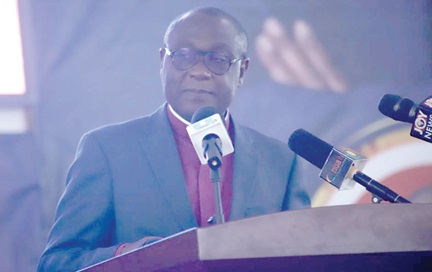
Religious bodies must preach truth, peace — Chairman of National Peace Council
The Chairman of the National Peace Council (NPC), Reverend Ernest Adu-Gyamfi, has stated that this year’s election will test the peace, unity, stability, cohesion and resilience of the county, and has consequently charged all religious bodies to use their platforms to preach and demonstrate peace for the citizenry to follow.
He said each election year sees records of violent incidents and it was time for religious bodies who all preach peace, to strongly be advocates on their respective platforms and further charged them to advocate for the truth and not to allow the media and politicians to dictate the pace of the country.
“Let us avoid pushing WhatsApp messages around only to show how chaotic our country is becoming, but take practical steps to intervene where possible for the sake of national peace and cohesion,” he urged the populace.
Rev. Adu-Gyamfi made the call when he delivered an address at the 61st Ghana Baptist Convention (GBC) Minister’s Conference at the Baptist Women’s Retreat Centre at Ejura in the Ashanti Region yesterday.
Present at the conference were the President of the Baptist Minister’s Conference, Rev. Dr Charles Owusu Ampofo; the President, the Ghana Baptist Convention, Rev. Enock Nii Narh Thompson, and the General Superintendent, Assemblies of God, Ghana, Rev. Dr Stephen Yenusom Wengam.
Worrying development
Rev. Adu-Gyamfi said as a country where majority of the population claimed to be Christians, it was worrying that Ghana continued to slip on the global peace index. “Last year, Ghana lost its position on the Global Peace Index as the most peaceful country in West Africa to Sierra Leone and as the second most peaceful country in Africa to the fourth position,” he said.
![]()
“While the church in Ghana continues to glory in the fact that 72 per cent of Ghanaians were Christians, our numbers do not correspond to the peace, stability and cohesion that one would have expected in a country with that number of Christians,” he stated.
The NPC chairman also noted that the rise of religious militants, including Christians in the country who were seeking dominance by force, was of great worry to the National Peace Council.
“We, the leaders of the church, have a responsibility to give direction to this country through our pulpits and with serious advocacy through our counsels, instead of allowing the media and politicians to dictate the pace and the future of our country,” he noted.
He stated it was unfortunate for the church to only look up to the NPC to react to the daily insults and hate speeches on many radio and television programmes against elders, clergy, chiefs, politicians among others, as well as the call for violence by some political actors, describing that as “a clear neglect of the duty and responsibility of the church”.
Ethics, accountability, responsibility
The Administrator of the District Assemblies Common Fund, Irene Nana Torshie Addo-Laryeh, who was the Special Guest, emphasised the need for all people in leadership roles to be ethical, accountable and responsible to the people.
“As captured eloquently in Luke 12:48: To whom much is given, much is required,” she reminded leaders. Speaking on the theme: “Ministerial Ethics, Accountability, and Responsibility in the 21st Century Church”, Mrs Addo-Laryeh said, “as leaders, both in faith or civic spheres, we must be reminded that our impact must not be measured by their accolades, but by the positive changes we inspire in the lives of others”.
“Let’s champion the course of tolerance and peace. Ghana stands as a beacon of democracy in Africa,” she reminded leaders.
